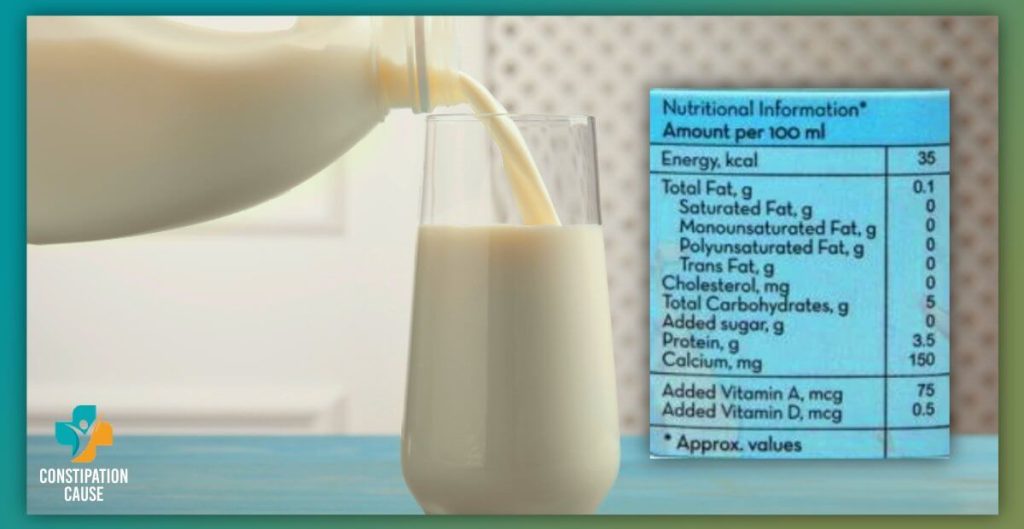Skim milk, often known for its low-fat content, has sparked discussions about its potential connection to constipation.
If you are one of the individuals who include skim milk in their diets or are concerned about digestive health, this article is all you need to read.
In this article, we will discuss in detail “does skim milk cause constipation?” and talk about the the relationship between skim milk and constipation.
So, let’s get started!
What is Skim Milk?
Skim milk, also known as fat-free or non-fat milk, is a dairy product from which the fat content has been removed. Unlike whole milk, which contains about 3.5% fat, skim milk contains less than 0.5% fat.
The fat is removed through a process of skimming or separating it from the milk, resulting in a lighter and lower-calorie alternative.
Nutritional Content and Benefits of Skim Milk:

- High-Quality Protein: Skim milk is a rich source of high-quality protein, essential for muscle development, repair, and overall body function.
- Calcium for Bone Health: It provides a significant amount of calcium, supporting bone health and helping prevent osteoporosis.
- Vitamins: Skim milk retains essential vitamins such as vitamin D, crucial for calcium absorption and contributing to overall immune health.
- Low Fat Content: The key benefit lies in its reduced fat content, making it a lower-calorie option for those aiming to manage weight or maintain a heart-healthy diet.
- Supports Weight Management: The lower caloric density makes skim milk a favorable choice for individuals focusing on weight management without compromising essential nutrients.
- Heart-Healthy: Choosing skim milk aligns with heart-healthy dietary recommendations by reducing saturated fat intake, supporting cardiovascular well-being.
- Versatility in Diets: Skim milk’s popularity as a low-fat alternative makes it a versatile addition to various diets, accommodating preferences for those seeking nutrient-dense options.
Constipation-Symptoms & Contributing Factors:
Common Symptoms:
- Infrequent Bowel Movements: Having fewer than three bowel movements per week.
- Straining: Difficulty and discomfort during bowel movements.
- Hard or Lumpy Stools: Stool consistency that is hard, dry, or difficult to pass.
- Incomplete Evacuation: Feeling that there’s more stool to pass after a bowel movement.
Factors Contributing to Constipation:
- Low-Fiber Diet: Inadequate intake of fiber can lead to difficulty in moving stool through the digestive tract.
- Inadequate Fluid Intake: Insufficient water consumption can result in hard and dry stools.
- Lack of Physical Activity: Sedentary lifestyles may contribute to sluggish bowel movements.
- Ignoring the Urge: Ignoring the natural urge to have a bowel movement can disrupt the body’s natural rhythm.
Impact of Dairy Products on Digestion:
Dairy products, while rich in essential nutrients, can have varying effects on digestion:
- Dairy provides vital nutrients such as calcium, vitamin D, and protein, contributing to overall health.
- Dairy contains lactose, a sugar requiring the enzyme lactase for digestion.
- Some individuals may experience digestive discomfort due to lactose sensitivity, where the body produces insufficient lactase to break down lactose effectively.
- The fermentation of undigested lactose in the colon can lead to symptoms like bloating, gas, and abdominal discomfort.
Now, let’s talk about skim milk’s role in causing digestive issues;
Does skim milk consumption result in constipation?
There exists a hypothesis suggesting a potential relationship between skim milk and constipation
Potential Reasons behind the Hypothesis:
- Reduced Fat Content: Skim milk’s lower fat content might impact the lubrication of the digestive tract, potentially influencing stool consistency or bowel movements.
- Altered Composition: The removal of fat during the skimming process could alter the overall composition of the milk, which may have implications for digestion.
- Individual Variability: Digestive responses can vary among individuals, and some may find that the absence of fat in skim milk affects their digestive processes differently.
Existing Studies or Research:
- There is limited scientific studies directly addressing Skim milk’s role in causing digestive issues
- Anecdotal evidence and individual experiences suggest a potential link, but comprehensive research is necessary to establish a definitive correlation.
- Further investigation is warranted to explore the specific mechanisms or factors contributing to any observed effects, and to understand if these effects are consistent across diverse populations.
Importance of Dietary Fiber in Preventing Constipation:

Skim milk and its effect on digestive health can be prevented by the use of dietary fiber!
- Bulk and Softness: Dietary fiber adds bulk to stool, promoting softness and regular bowel movements.
- Improved Transit: Fiber helps move stool efficiently through the digestive tract, reducing the risk of constipation.
- Feeding Gut Microbiota: Certain types of fiber act as prebiotics, nourishing beneficial gut bacteria and supporting overall gut health.
- Skim Milk’s Low Fiber Content:
- Potential Relevance: Skim milk, while nutritious, is relatively low in dietary fiber compared to other food sources.
- Consideration for Constipation: Individuals relying heavily on skim milk without obtaining sufficient fiber from other sources might be at a higher risk of constipation.
- Examples of High-Fiber Foods:
Skim milk and its influence on bowel regularity can be controlled by intaking high fiber foods such as:
- Whole Grains: Brown rice, quinoa, oats.
- Legumes: Lentils, chickpeas, black beans.
- Fruits: Berries, apples, pears.
- Vegetables: Broccoli, Brussels sprouts, carrots.
Hydration and Constipation:
Constipation caused by drinking skim milk can be reduced by staying fully hydrated!
- Connection between Proper Hydration and Regular Bowel Movements:
- Stool Softening: Adequate hydration maintains stool softness, facilitating smoother bowel movements.
- Prevention of Dehydration: Proper hydration helps prevent dehydration, a common cause of constipation.
- Skim Milk’s Impact on Hydration:
- Fluid Contribution: Skim milk, like any fluid, contributes to overall hydration.
- Diuretic Effect: Consideration should be given to its diuretic effect, potentially influencing hydration levels.
- Tips on Staying Hydrated:
- Water Consumption: Drink an adequate amount of water throughout the day.
- Hydrating Foods: Include hydrating foods like fruits and vegetables in the diet.
- Monitor Urine Color: Pale yellow urine indicates proper hydration.
- Limit Dehydrating Beverages: Reduce consumption of caffeinated and alcoholic beverages.
Other Dairy Alternatives:
If you feel a negative impact of skim milk on bowel movements, then you may consider the following alternatives:
- Lactose-Free Milk: Suitable for individuals with lactose intolerance, providing the benefits of dairy without the digestive discomfort.
- Almond Milk: Low in calories and a good source of vitamins, but may lack protein compared to dairy milk.
- Soy Milk: Offers a comparable protein content to cow’s milk and is a complete protein source, suitable for those with soy tolerance.
- Oat Milk: Contains beta-glucans, promoting heart health, but may be higher in calories and carbohydrates.
Comparative Nutritional Profiles:
- Lactose-Free Milk: Similar to dairy milk in terms of nutrients, with added benefits for lactose-intolerant individuals.
- Almond Milk: Lower in calories and saturated fat, but may be lower in protein and lack certain nutrients found in dairy.
- Soy Milk: Comparable protein content to cow’s milk, with added benefits for individuals with lactose intolerance or seeking a plant-based option.
- Oat Milk: Rich in beta-glucans, providing potential heart health benefits, but higher in calories and carbohydrates.
Potential Benefits and Drawbacks:
Lactose-Free Milk:
- Benefits: Suitable for those with lactose intolerance, maintains nutrient content.
- Drawbacks: May be more expensive than other alternatives.
Almond Milk:
- Benefits: Low in calories, suitable for those on a weight management plan.
- Drawbacks: Lower in protein, may not be suitable for those with nut allergies.
Soy Milk:
- Benefits: Comparable protein content to dairy, suitable for those with lactose intolerance or seeking a plant-based option.
- Drawbacks: Potential allergen city for some individuals.
Oat Milk:
- Benefits: Rich in beta-glucans for heart health.
- Drawbacks: Higher in calories and carbohydrates, may not be suitable for those watching their calorie intake.
Conclusion:
In conclusion, while the relationship between skim milk and constipation has been explored, the existing evidence remains inconclusive. The article has outlined the nutritional benefits of skim milk, discussed factors like fiber and hydration in digestive health, and presented the hypothesis of a potential link to constipation. It is crucial to approach this topic with an understanding of individual variations in digestive responses and to consider alternative dairy options based on personal preferences and dietary needs. Readers are encouraged to maintain a balanced perspective, recognizing the need for further research in this area. Ultimately, for personalized advice on dietary choices and digestive health, consulting healthcare professionals is recommended, ensuring a holistic and informed approach to individual well-being.
Frequently Asked Question
Are there any studies proving the connection between skim milk and constipation?
Limited conclusive studies directly address this connection. Anecdotal evidence exists, but more research is needed for a definitive understanding.
Does drinking more water help prevent constipation caused by skim milk?
Adequate water intake is beneficial for overall digestive health and can potentially alleviate constipation. However, individual responses may vary.
Can skim milk worsen constipation in people with lactose intolerance?
Skim milk may be a suitable option for those with lactose intolerance, but individual tolerance varies. Lactose-free alternatives could be considered.
Is it advisable to switch to whole milk if I experience constipation due to skim milk?
Whole milk contains more fat, which may affect digestion differently. Consultation with a healthcare professional is recommended for personalized advice.
Are there alternative dairy products that are less likely to cause constipation?
Lactose-free milk or alternative plant-based options like almond, soy, or oat milk are potential alternatives. Individual tolerance should be considered.
How long should one abstain from skim milk to see if it’s causing constipation?
A few weeks of abstaining from skim milk while monitoring digestive changes can help assess its impact. If concerns persist, consultation with a healthcare provider is advised.









Leave feedback about this